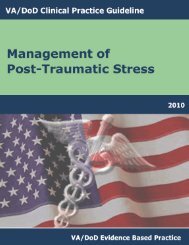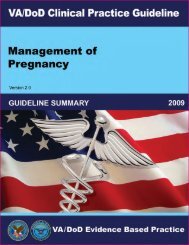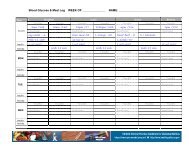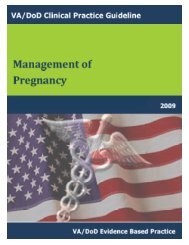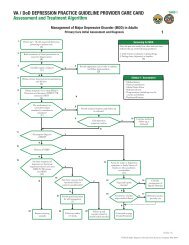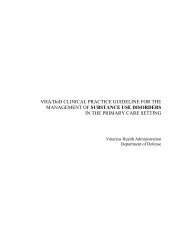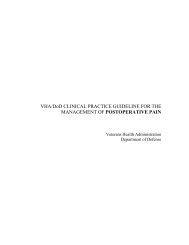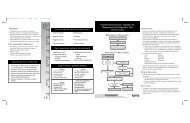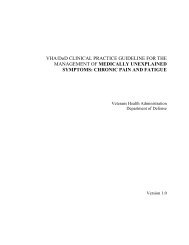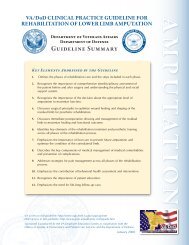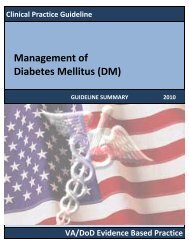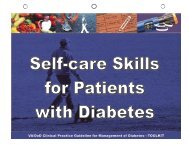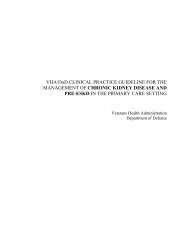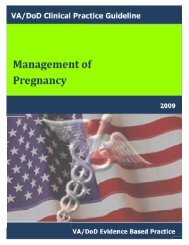DM Full Guideline (2010) - VA/DoD Clinical Practice Guidelines Home
DM Full Guideline (2010) - VA/DoD Clinical Practice Guidelines Home
DM Full Guideline (2010) - VA/DoD Clinical Practice Guidelines Home
Create successful ePaper yourself
Turn your PDF publications into a flip-book with our unique Google optimized e-Paper software.
Version 4.0<br />
MODULE M: SELF-MANAGEMENT& EDUCATION<br />
ANNOTATIONS<br />
<strong>VA</strong>/<strong>DoD</strong> <strong>Clinical</strong> <strong>Practice</strong> <strong>Guideline</strong><br />
for the Management of Diabetes Mellitus<br />
A. Is This a Patient With Newly Diagnosed Diabetes Mellitus?<br />
Module M applies to patients who have been diagnosed with diabetes mellitus (<strong>DM</strong>) and require diabetes selfmanagement<br />
education (DSME) as well as knowledge and skills to facilitate implementation of their treatment plan.<br />
B. Provide Information and Education on Basic Concepts and Core Competencies, Document Findings<br />
OBJECTIVE<br />
Ensure that patients with diabetes understand the core competencies (survival skills) and other basic information so<br />
that they may safely self-manage their diabetes.<br />
RECOMMENDATIONS<br />
1. Ensure that patients newly diagnosed with <strong>DM</strong> are provided with core competency education.<br />
The core competencies include:<br />
• Acute complications (hyperglycemia and hypoglycemia)<br />
• Medication education<br />
• Self-monitoring of blood glucose and how to use the results<br />
• Basic diet principles<br />
• Sick day management<br />
• When to seek further assistance<br />
(See Appendix M-1: Core Competencies [Survival Skills] for Patients with Diabetes).<br />
DISCUSSION<br />
Core competency education addresses basic principles of diabetes management. Individuals receiving insulin, and<br />
other high-risk populations may benefit from a comprehensive DSME program.<br />
Patient education materials identified in the following appendices as well as other patient education materials can be<br />
made available to the patient in the office setting to assist the healthcare team in addressing additional concepts and<br />
information not included in the core competencies:<br />
C. Refer for Comprehensive Diabetes Self-Management and Diet Education<br />
OBJECTIVE<br />
Provide or refer for comprehensive Diabetes Self-Management Education (DSME) and Medical Nutrition Therapy<br />
(MNT) education.<br />
BACKGROUND<br />
Diabetes self-management is considered necessary by most healthcare organizations to assist persons with diabetes<br />
(a) in their day-to-day self-management demands and (b) with making informed self-care choices. This includes<br />
providing behavioral strategies that establish and maintain a healthy lifestyle. Since the diabetes clinical state<br />
fluctuates within individuals over their life span, education programs need to be comprehensive enough to provide<br />
clinical knowledge and skills to facilitate implementation of the changing treatment plans.<br />
RECOMMENDATIONS<br />
1. Patients newly diagnosed with diabetes should receive comprehensive DSME and education for MNT.<br />
2. DSME, including MNT education, should be an interactive, collaborative, ongoing process involving<br />
patients with diabetes and educators and include the following four-step process:<br />
o<br />
o<br />
o<br />
Assessment of the patient’s educational needs<br />
Identification of the patient’s specific self-management goals<br />
Education and behavioral interventions aimed at meeting the patient’s goals<br />
Module M: Self-management Page 108



